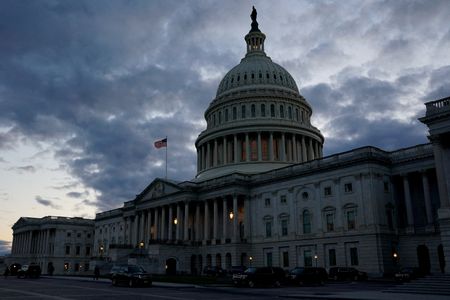By Patricia Zengerle
WASHINGTON (Reuters) -The U.S. Senate voted overwhelmingly for an $895 billion bill setting policy for the Pentagon on Wednesday, despite the inclusion of a controversial provision on transgender medical care for minors.
The 100-member Senate backed the National Defense Authorization Act, or NDAA, by 85 to 14.
Since it passed the House of Representatives last week, approval sends it to the White House, where the bill’s congressional supporters say President Joe Biden is expected to sign it into law.
This year’s NDAA authorizes a record $895 billion in annual military spending, covering purchases of ships, aircraft and weapons, and including provisions intended to boost competitiveness with geopolitical rivals like China and Russia.
The 1,800-page bill also focuses on improving the quality of life for the U.S.
military.
It authorizes a 14.5% pay increase for the lowest-ranking troops, and 4.5% for the rest of the force, higher than usual. It also authorizes billions of dollars for military housing, schools and childcare centers.
The bill bans the military health program, TRICARE, from covering some gender-affirming care for the transgender children of service members if it could risk sterilization, a provision that caused some Democrats to vote no in the Senate and in the House.
“The NDAA is not perfect, but it still makes several important advances Democrats fought for,” Senate Democratic Majority Leader Chuck Schumer said in the Senate before the vote.
POLITICAL FOCUS ON TRANSGENDER RIGHTS
Including the transgender provision in a bill setting policy for the Department of Defense underscored how transgender issues have become a focus in U.S.
politics.
President-elect Donald Trump and many other Republicans made support for transgender rights a major point of attack on Democrats during the 2024 election campaign, which ended with Republicans keeping control of the House and taking control of the Senate and White House starting next month.
The NDAA passed the House last week by 281 to 140, with dozens of Democrats voting no.
This year’s NDAA increases U.S.
assistance to Israel and allows the expansion of military resources to prevent migrants from crossing the U.S. southern border from Mexico.
On Ukraine, it requires only a report on Defense Department efforts on “lessons learned” from the conflict, reflecting growing reluctance from Trump’s fellow Republicans to keep assisting Ukraine, although the NDAA has not been the main vehicle for aid to Kyiv.
The fiscal 2025 NDAA is a compromise between Democrats and Republicans in the House and Senate, reached during weeks of negotiations behind closed doors.
It did not include some other Republican proposals on social issues, including an effort to prohibit TRICARE from covering gender-affirming care for transgender adults.
The massive bill is one of the few major pieces of legislation Congress passes every year and lawmakers take pride in having passed it annually for more than six decades.
The NDAA authorizes Pentagon programs, but does not fund them.
Congress must separately pass funding in a spending bill for the fiscal year ending in September 2025. That bill is unlikely to be enacted before March.
(Reporting by Patricia Zengerle; Editing by Chizu Nomiyama and Diane Craft)












